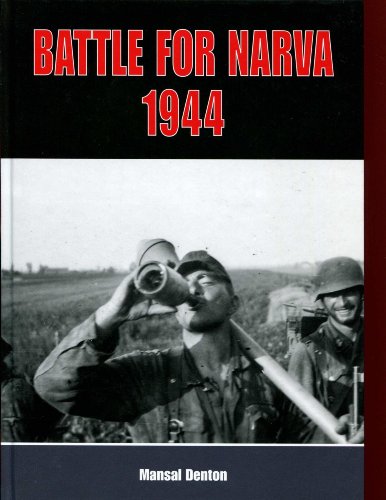
Battle for Narva, 1944
by Mansal Denton
Popularity
3.37 / 5
* A book's popularity is determined by how it compares to all other books on this website.
Where to buy?
Buy from Amazon* If you buy this book through the link above, we may receive a small commission at no extra cost to you.
Battle for Narva, 1944 by Mansal Denton
Details
War:
World War II
True Story:
Yes
Biography:
No
Region:
Europe
Published Date:
2010
ISBN13:
9783905944013
Description
Brief Summary
Battle for Narva, 1944 by Mansal Denton delves into a lesser-known yet significant battle during World War II. The book documents the unfolding of the Battle of Narva, focusing primarily on the strategic maneuvers and the volunteers who fought alongside the Axis forces. Denton provides a well-researched account of these volunteers, often perceived as having fought on the "wrong" side, discussing their motivations and the impact of their involvement in this key moment of the war. Through meticulous research, the book sheds light on the complexity of wartime alliances and the individual stories of those who partook in this pivotal event.
Main Themes and Topics
The central theme of Battle for Narva, 1944 revolves around the detailed chronological account of the battle itself, highlighting strategic decisions and battlefield dynamics. Furthermore, the book explores the moral and ethical quandaries faced by the foreign volunteers who aligned themselves with the Axis powers. Through its narrative, the book reveals the multifaceted nature of war, exploring themes of loyalty, nationalism, and the personal convictions that drive individuals to make controversial wartime choices. Denton also addresses the historiographical challenge of analyzing the role of these volunteers within the broader context of World War II, a theme that underpins the entire work.
Writing Style and Tone
Mansal Denton's writing style in Battle for Narva, 1944 is clear and scholarly, geared towards readers who appreciate a detailed military history. The tone is formal and educational, reflecting the author's commitment to presenting a factual and unbiased account of events. Denton skillfully balances descriptive passages with tactical analyses, ensuring that readers can easily follow the complex military operations and understand their significance. The prose is effective in engaging readers with both the strategic dimensions and human aspects of the battle, making the historical narrative accessible without sacrificing depth or accuracy.
Criticism
While Battle for Narva, 1944 provides a comprehensive look at the historical events, some readers may find the book's focus on the military and strategic aspects at the expense of broader contextual elements somewhat limiting. The emphasis on detailed battle descriptions might appeal more to aficionados of military history rather than general readers looking for a wider perspective on World War II. Additionally, the book's exploration of the motivations and perspectives of the foreign volunteers, while thorough, may leave some readers desiring more personal anecdotes or individual narratives to complement the historical analysis.









